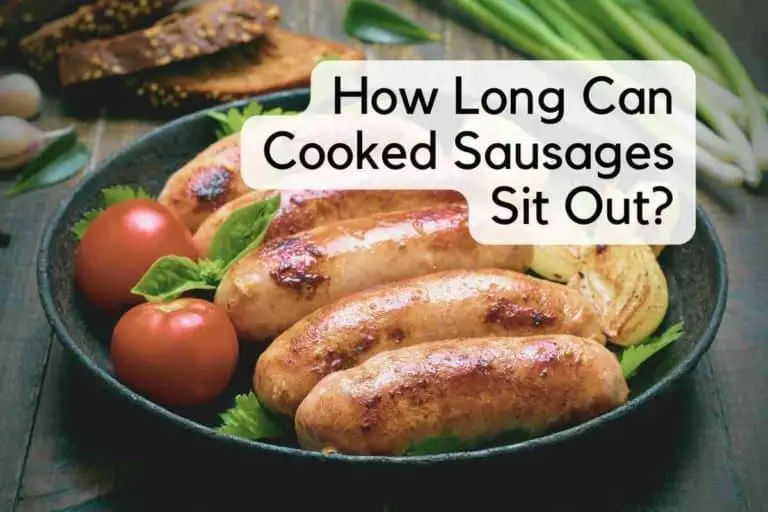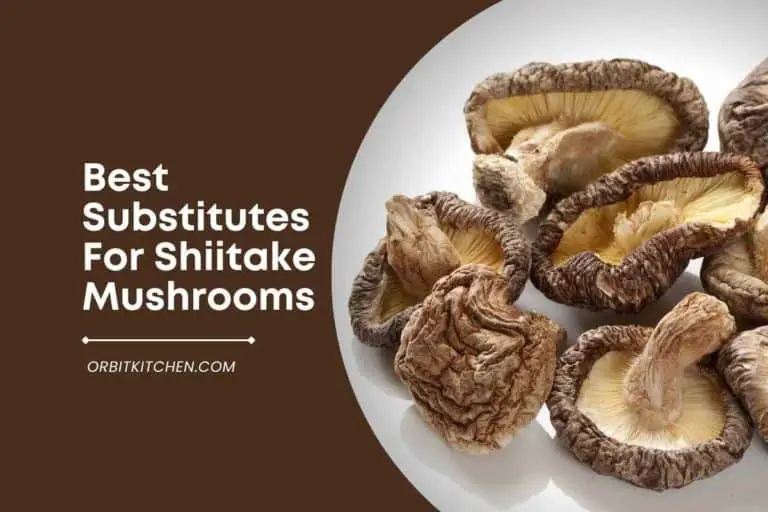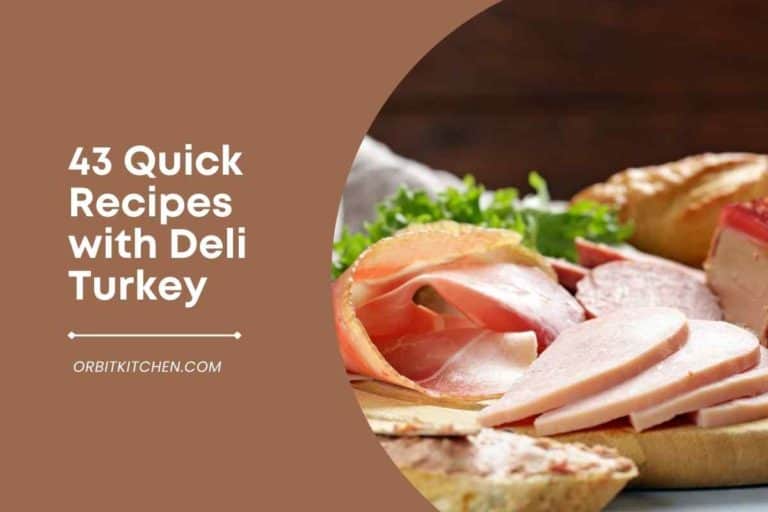Can You Leave Pasta in Water After Cooking?
If you’ve ever cooked pasta, you know how much water is required to get it to the right consistency. Most people think that you can simply keep the pasta in the fridge once the pasta is cooked. But what if you forget to drain the pasta before putting it in the refrigerator?
Can you leave pasta in water after cooking?
You can leave the pasta in its water after cooking; however, it will start to absorb the water and become softer the longer you leave it. If you are going to eat your pasta cold or reheat it later, I suggest you keep it in the sauce. Otherwise, store your cooked pasta in a suitable container with an airtight lid.
The best way to reheat cold pasta is to add some water to the pan, heat it on low heat, then add the cold pasta and stir. The water will make sure that the sauce evenly coats all of the pasta. This method also works best with tomato sauces or creamy sauces, as these can dry out during reheating.
In this guide, we’ll explore the topic of leaving the pasta in water after cooking in detail.
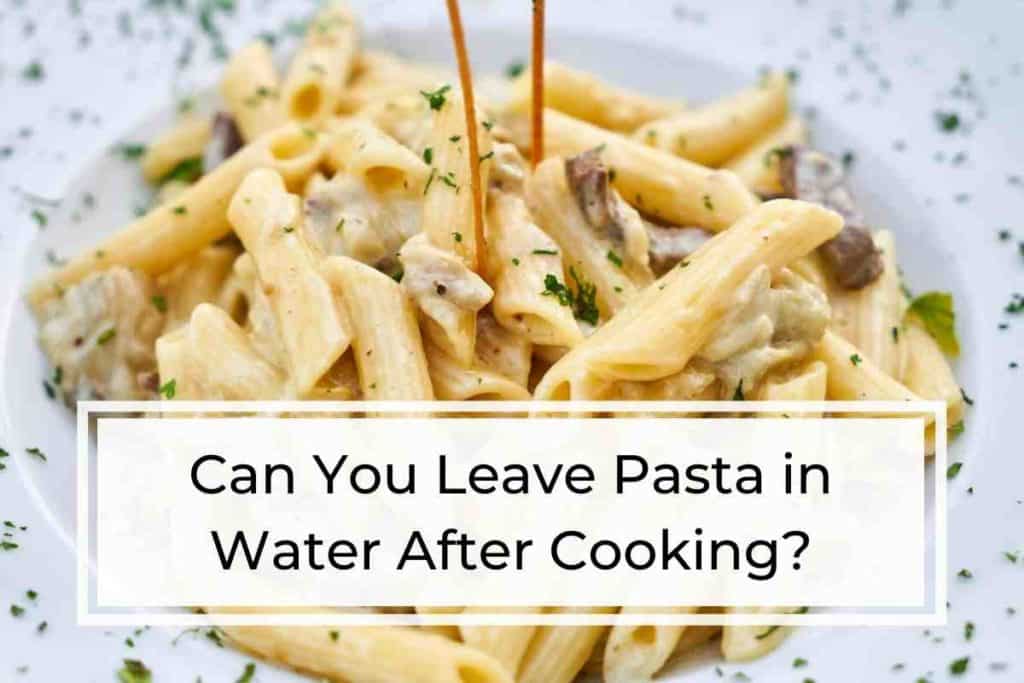
If you are interested in the best kitchen products and accessories, be sure to visit my Recommended Products Page (click to see my page), Which includes all of my top picks by category.
What Happens If You Leave the Pasta in Water Overnight?
There is a widespread belief that leaving pasta in water overnight will spoil it. We’ve all heard it, but I bet you’ve never seen it! The short answer is no. You can leave your pasta in water overnight, and it’ll be just fine to eat. It won’t spoil, but it will have some notable changes to its texture.
Leaving your pasta in water for too long means the noodles soak up excess moisture and become soft, soggy, and even mushy! If you’re doing this deliberately (to make a casserole or a slow-cooked recipe), that might be what you want.
Can You Store Pasta in Water?
You can store pasta in the water it’s been cooked in; however, make sure that the water is cold, and then cover it with plastic wrap or a lid to preserve the temperature. If you let the water get too warm or hot, you’ll be more likely to introduce bacteria into your dish when you add your ingredients. Plus, no one likes lukewarm pasta!
You should also keep in mind that this method of storing pasta is meant for short-term use only—it’s not safe for long-term storage. The recommended time frame for storing cooked pasta in liquid at room temperature is 2 hours. It’s best practice to cook and eat your food as soon as possible after preparing it to avoid any potential issues.
Also, check our detailed guide on boiling pasta in milk, for more information about pasta.
How Long Does Pasta Last in Water?
It depends on your water temperature; the cooler the water, the longer the pasta will last.
You can keep your pasta in the water for up to 24 hours, but yet after about 12 hours, the pasta will start to turn mushy. I recommend keeping your pasta in for about 6-8 hours and then cooking it.
The cooked pasta should be drained and promptly left to cool down, either by leaving it to sit for a few minutes or running cold water over it. If you’re short on time, the best thing to do is drain the pasta and run a little cold water through it—but stop before all the starch washes off! Too much rinsing will actually keep your sauce from sticking to your noodles.
The cooled-down pasta can then be stored in an airtight container in the fridge for 3-5 days. To reheat, simply drop the pasta in boiling water for a minute or two until heated through. You can also freeze pasta and store it in freezer-safe containers for 2-3 months, though this method works best with richly flavored sauces (like tomato sauce or pesto) rather than creamy sauces.
Don’t try storing boiled pasta in Tupperware. I learned this lesson the hard way when I put ricotta cheese on my frozen penne and forgot about it until three weeks later when I finally cleaned out my freezer—and found that unidentifiable mass of sour cheese paste at its bottom.
How to Keep the Pasta from Drying Out After Cooking?
You can prevent cooked pasta from drying out by tossing it in olive oil while it’s still hot. Alternatively, you can cool the pasta to room temperature and then place it in an airtight container, best for short-term storage.
Most chefs prefer to make a small amount of pasta at a time rather than cook everything all at once and keep some of it warm. If you need to store your pasta longer than a day (or if you don’t have an airtight container), you’ll also need to refrigerate or freeze the pasta after letting it cool down. To do this properly, add a dash of salt over your cooled pasta before placing it into an airtight plastic bag or container. If refrigerating for more than 3 days, freeze the pasta instead.
You can also add some grated parmesan cheese or other pasta sauce ingredients (e. g., tomato paste) on top of your cooked noodles before covering and storing them in the refrigerator overnight – this will prevent them from drying out; completely!
Does Soaking Pasta Reduce Cooking Time?
It turns out that soaking pasta doesn’t actually reduce the amount of time it takes to cook. In fact, some researchers have found that it actually increases the total cooking time!
Well, when you soak pasta, you increase its moisture content. This means it needs more time in the oven or on the stovetop to dry out again. Often, this drying process won’t happen until after your pasta has been drained and is sitting in a serving dish.
This can be really annoying if you’re trying to plate your food quickly—no one wants soggy food!
Of course, there are other reasons why you might want to soak your pasta. If you’re making lasagna or ravioli with long noodles that need to be bent into shape before cooking and serving, soaking will definitely help them turn more easily.
The ideal way to make sure your pasta cooks quickly and evenly is to start with plenty of boiling water (at least 6 quarts for 1 pound) and salt it liberally—about 1 teaspoon per 2 quarts. As soon as the water comes to a full boil, add your pasta and constantly stir for at least 2 minutes until you drain it.
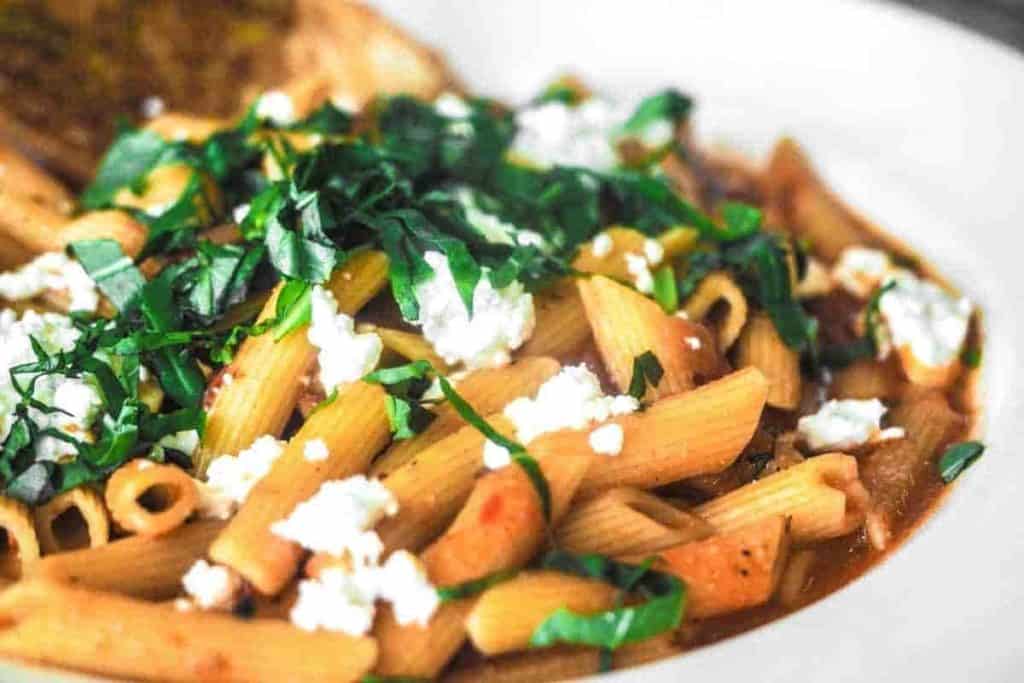
Should You Pour Boiling Water Over Cooked Pasta?
You can pour the boiling water over cooked pasta to get it ready for the cooking process. Also, cooking spaghetti or any other type of pasta in boiling water is the best way to ensure it cooks evenly and doesn’t become gummy or sticky.
The sticky pasta is caused by the starch on the outside of the uncooked pasta being exposed to a hot environment. When you cook your pasta in boiling water, you also warm up the starch molecules inside and outside each noodle.
When the starch comes in contact with hot water, it expands, making each little noodle “puff” up as it gets cooked. By pouring more hot water over your cooked noodles, you’re keeping them from getting gummy by keeping them warm and plump.
If you want to make sure your noodles are tender and tasty after being cooked, then pouring boiling water over them is probably one of the easiest ways. The main thing you have to remember is that not all pasta is created equal.
Should You Run Cold Water Over Cooked Pasta?
You can run the cold water over the cooked pasta, but I find that it is unnecessary. There are some situations where you might want to use cold water. When the pasta is served hot, immediately after it has been cooked.
The cold water will stop the cooking and ensure that you don’t end up with overcooked pasta. I find this to be a good idea when cooking things like macaroni and cheese or any other dish where you’re going to be combining the cooked pasta with something else after it’s done cooking, rather than serving it on its own.
When the pasta is served cold, in a salad or something similar. The cold water stops the cooking and makes sure that the pasta doesn’t become mushy as it cools down. This is how I always treat my pasta when making an Italian-style salad.
So, running cold water over your cooked pasta won’t prevent its mushy look; instead, it can help maintain freshness and texture.
Conclusion
Overall, it is best to avoid leaving pasta in water for an extended period. A few minutes won’t hurt, but you should practice the two-hour rule to be truly safe from a foodborne illness. If your food has been left out for two hours or more, you should remove and discard it.



